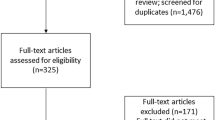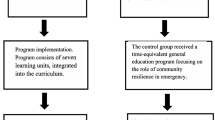Abstract
Objectives The purpose of this study was to evaluate the effectiveness of six online modules, the Cross Cultural Case Stories, designed to teach healthcare professionals and trainees to provide culturally competent care to children with chronic respiratory conditions and their families. Modules increase provider awareness of the types of factors that may vary between cultures. This study assessed learner change in the three domains of knowledge, attitudes and self-reported skills. Improving on earlier studies, this evaluation included a control group for comparison. Methods Subjects comprised 66 first and second year pediatric residents at the University of Florida. Each module includes Objectives, Key Word definitions, Case Story, Lecture, Interactive Exercises and References. Intervention subjects completed an assessment tool before and after training. Control subjects completed the spaced assessments without completing the modules in-between. Results Within the intervention group there was a significant effect associated with the intervention. On average, participants within this group improved 1.67 points on the knowledge assessment (p < .01), 13.64 points on the attitudes self-assessment (p = .01) and 6.86 points on the skills assessment (p ≤ 0.01). When comparing between the intervention and control group significant differences were found in the post knowledge, post skills and post attitudes assessment, with the intervention group exceeding scores from the control group. Conclusions The Cross Cultural Cases provide an accessible, comprehensive and effective means for teaching healthcare and public health professionals and trainees. These cases can potentially provide training for students and practicing professionals from multiple medical and public health related disciplines.
Similar content being viewed by others
References
Committee on Pediatric Workforce (2013). Enhancing Pediatric Workforce Diversity and Providing Culturally Effective Pediatric Care: Implications for Practice, Education and Policy Making. Pediatrics, 132, e1105–e1116.
American Academy of Pediatrics Committee on Pediatric Workforce. Ensuring culturally effective pediatric care: Implications for education and health policy. Pediatrics. 2004; 114 (6): 1677–1685.
American Association of Medical Colleges. Tool for Assessing Cultural Competence Training. Retrieved from December 5, 2015, from https://www.aamc.org/initiatives/tacct/
American College of Physicians. Cultural Proficiency: The Importance of Cultural Proficiency in Providing Effective Care for Diverse Populations. Philadelphia: American College of Physicians; 2014: Policy Paper. Retrieved from May 12, 2015, from http://www.aafp.org/about/policies/all/cultural-diverse-populations.html
Betancourt JR, Green AR, Carillo JE. Cultural competence in health care: Emerging frameworks and practical approaches. Field Report for the Commonwealth Fund. Retrieved from August 28, 2015, from http://www.commonwealthfund.org/publications/fund-reports/2002/oct/cultural-competence-in-health-care-emerging-frameworks-and-practical-approaches
Carter, M. M., Lewis, L. L., Sbrocco, T., Tanenbaum, R., Oswald, J. C., Sykora, W., Williams, P., & Hill, L. D. (2006). Cultural competency training for third-year clerkship students: effects of an interactive workshop on student attitudes. Journal of the National Medical Association, 98(11), 1772–1778.
Cheng, T. L., Emmanuel, M. A., Levy, D. J., & Jenkins, R. R. (2015). Child Health Disparities: What Can a Clinician Do? Pediatrics, 136(5), 961–968. doi:10.1542/peds.2014-4126.
Chin, J. L. (2000). Culturally competent healthcare. Public Health Reports, 115, 25–33.
Cohen, J. (1988). Statistical power analysis for the behavioral sciences (2nd edn.). Hillsdale, NJ: Lawrence Earlbaum Associates.
Crenshaw, K., Shewchuk, R. M., Qu, H., Staton, L. J., Bigby, J. A., Houston, T. K., Allison, J., & Estrada, C. (2011). What Should We Include in a Cultural Competence Curriculum? An emerging formative evaluation process to foster curriculum development. Academic Medicine, 86(3), 333–341.
Horvat, L., Horey, D., Romios, P., & Kis-Rigo, J. (2014). Cultural competence education for health professionals. Cochrane database of systematic reviews (Online), 5, CD009405. doi:10.1002/14651858.CD009405.pub2.
Institute of Medicine. (2003). Unequal Treatment: Confronting Racial and Ethnic Disparities in Health Care. Washington, D.C.: National Academy of Sciences
Lieu, T. A., Finkelstein, J. A., Lozano, P., Capra, A. M., Chi, F. W., Jensvold, N., Quesenberry, C. P., & Farber, H. J. (2004). Cultural Competence Policies and Other Predictors of Asthma Care Quality for Medicaid-Insured Children. Pediatrics, 114, e102–e110.
Lopez, L., Vranceanu, A. M., Cohen, A. P., Betancourt, J., & Weissman, J. S. (2008). Personal characteristics associated with resident physicians’ self preparedness to deliver cross cultural care. Journal of General Internal Medicine: Official Journal of the Society for Research and Education in Primary Care Internal Medicine, 23(12), 1953–1958.
Maldonado, M. E., Fried, E. D., DuBose, T. D., Nelson, C., & Breida, M. (2014). The role that graduate medical education must play in ensuring health equity and eliminating health care disparities. Annals of the American Thoracic Society, 11(4), 603–607. doi:10.1513/AnnalsATS.201402-068PS.
Muzumdar, J. M., Holiday Goodman, M., Black, C., & Powers, M. (2010). Cultural competence knowledge and confidence after classroom activities. American Journal of Pharmaceutical Education, 74(8), 150.
Noble, C. C., Jensen, E., & Steffen, D. Moving the Needle: A Retrospective Pre- and Post-analysis of Improving Perceived Abilities Across 20 Leadership Skills. Maternal and Child Health Journal. 14(4), 642–648.
Palmer, R. C., Smason, R., Triantis, M., & Mullan, I. D. (2011). Development and evaluation of a web-based breast cancer cultural competency course for primary healthcare providers. BMC Medical Education, 11, 59.
Staton, L. J., Estrada, C., Panda, M., Ortiz, D., & Roddy, D. (2013). A multimethod approach for cross-cultural training in an internal medicine residency program. Medical Education Online, 18, 20352. doi:10.3402/meo.v18i0.20352.
Acknowledgements
The authors would like to thank the faculty of the national Pediatric Pulmonary Centers who assisted in the content development of the Cross Cultural Case Studies. The authors would also like to thank the University of Wisconsin Department of Instructional Technology for developing the templates used in this project. A list of contributing individuals can be found at http://support.mchtraining.net/national_ccce/developers.html. This project was funded in part by the Maternal and Child Health Bureau Grant #T72MC00002.
Author information
Authors and Affiliations
Corresponding author
Rights and permissions
About this article
Cite this article
Horky, S., Andreola, J., Black, E. et al. Evaluation of a Cross Cultural Curriculum: Changing Knowledge, Attitudes and Skills in Pediatric Residents. Matern Child Health J 21, 1537–1543 (2017). https://doi.org/10.1007/s10995-017-2282-3
Published:
Issue Date:
DOI: https://doi.org/10.1007/s10995-017-2282-3




